Imagine how much you’d use your swimming pool if the water was warm to the touch all year round.
How rejuvenating would it feel to take a dip in December?
No numb fingers.
No sharp in-takes of breath.
No wishing and waiting for a spa day.
You’ve got your own heated swimming pool out your back door!
But you can guess that heating your swimming pool comes with a bill at the end of the month – we’ve spoken to homeowners who installed an electric pool heater, paid €800 for electricity in the first month, and never used their pool heater again.
Is solar pool heating in Spain the answer?
free download
Want to See the Estimated Monthly Cost to Heat a Swimming Pool to 26°C in Spain in March?
We’ve prepared a .pdf comparing estimated monthly electricity costs to heat a swimming pool using 3 different methods – including our recommended method of using solar panels with a heat pump.
Click below and enter your email address to get the download.
Can I heat my swimming pool with solar energy in Spain?
Yes, you can.
There are two types of solar installations that offer solar pool heating:
- Photovoltaic solar panels (sunlight into electricity)
- Thermal solar panels (sunlight into heat)
MiSolar specialises in PV solar panel installations and high-efficiency pool pumps and pool heaters in Spain.
In fact, if you dream of the health benefits of a heated pool we strongly recommend PV solar panels.
The reasons why are not well understood – we’ll explain why below!
Why is it a good idea to use solar pool heating in Spain?
A heated pool offers a range of benefits to homeowners.
The main benefits are health-related.
A heated pool lets you swim and exercise your muscles in warm, soothing water for more than just the 3-4 months when it’s warm enough naturally in summer.
But there are many more benefits to having a heated pool.
These include:
- Higher rental income – a heated pool is a real draw for holidaymakers and out-of-season tourists visiting a place like Spain, and you can charge more for it
- Higher property value – a heated pool increases the value of your property
- Happy family – your family, friends, visitors and guests will love using a heated pool
- Environmentally friendly – solar pool heating is an environmentally friendly alternative to using gas-powered or conventional electric pool heaters
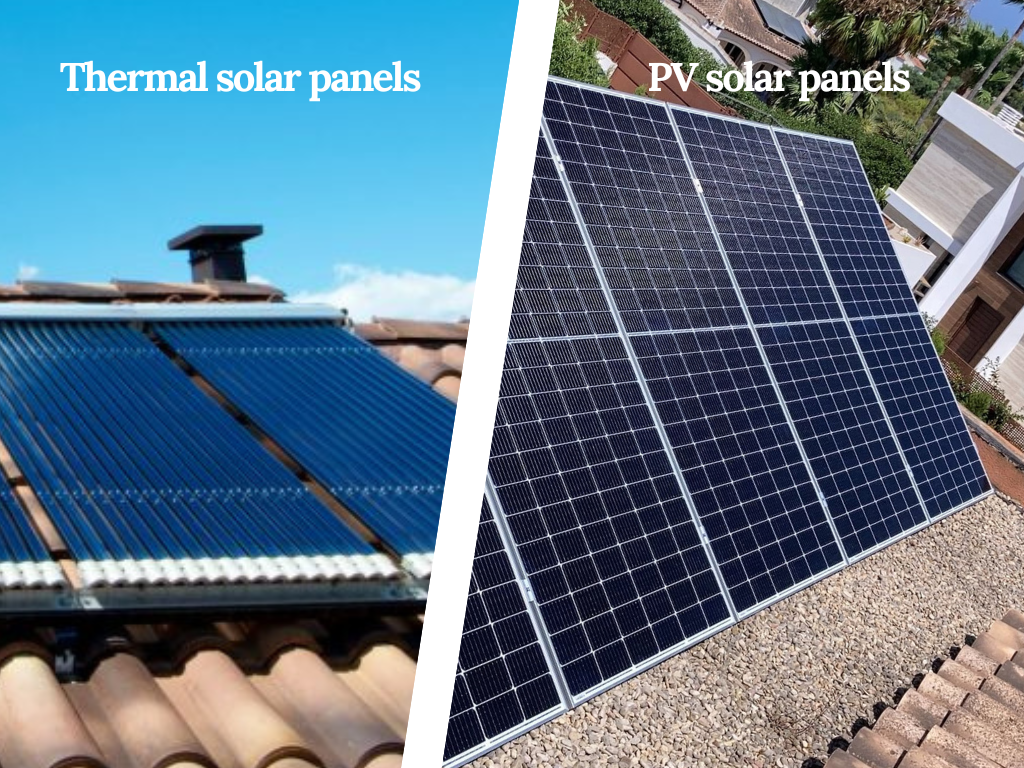
PV solar panels vs thermal solar panels – which is best to heat my swimming pool in Spain?
Thermal solar panels
Thermal solar panels do not generate electricity.
Like reptiles warming up in the sun, a thermal solar panel warms water that is pumped through a series of tubes (usually installed on your roof) and returns to your pool again until the water has reached the desired temperature.
Thermal solar panels are great for extending the swim season for 1-2 months either side of summer.
But they come with some disadvantages:
- You can’t heat your pool in winter with thermal solar panels
- You can’t heat your pool on cloudy days with thermal solar panels
- You still need to pay for electricity to power your pool pump
If you want to heat your pool whenever you like and still take advantage of solar energy, you’re going to need a photovoltaic solar installation.
Photovoltaic solar panels
Photovoltaic solar panels generate electricity.
Sunlight is converted into direct current (DC) electricity through a series of solar cells contained within the panel – this electricity is converted into alternating current (AC) by a solar inverter so it can power home electrics without consuming from the grid.
Using a pool heater + PV solar panels comes with advantages over thermal solar panels:
- You can heat your pool in winter using a pool heater + PV solar panels
- You can heat your pool on cloudy days with a pool heater + PV solar panels
- You don’t need to pay for electricity to power your pool pump
Unless you have a very large array or a solar battery, PV solar panels may not provide enough power on cloudy days or in winter to power your pool pump and pool heater on their own.
But if you combine a PV solar panel installation with an air-source heat pump pool heater you can keep your bills surprisingly low.
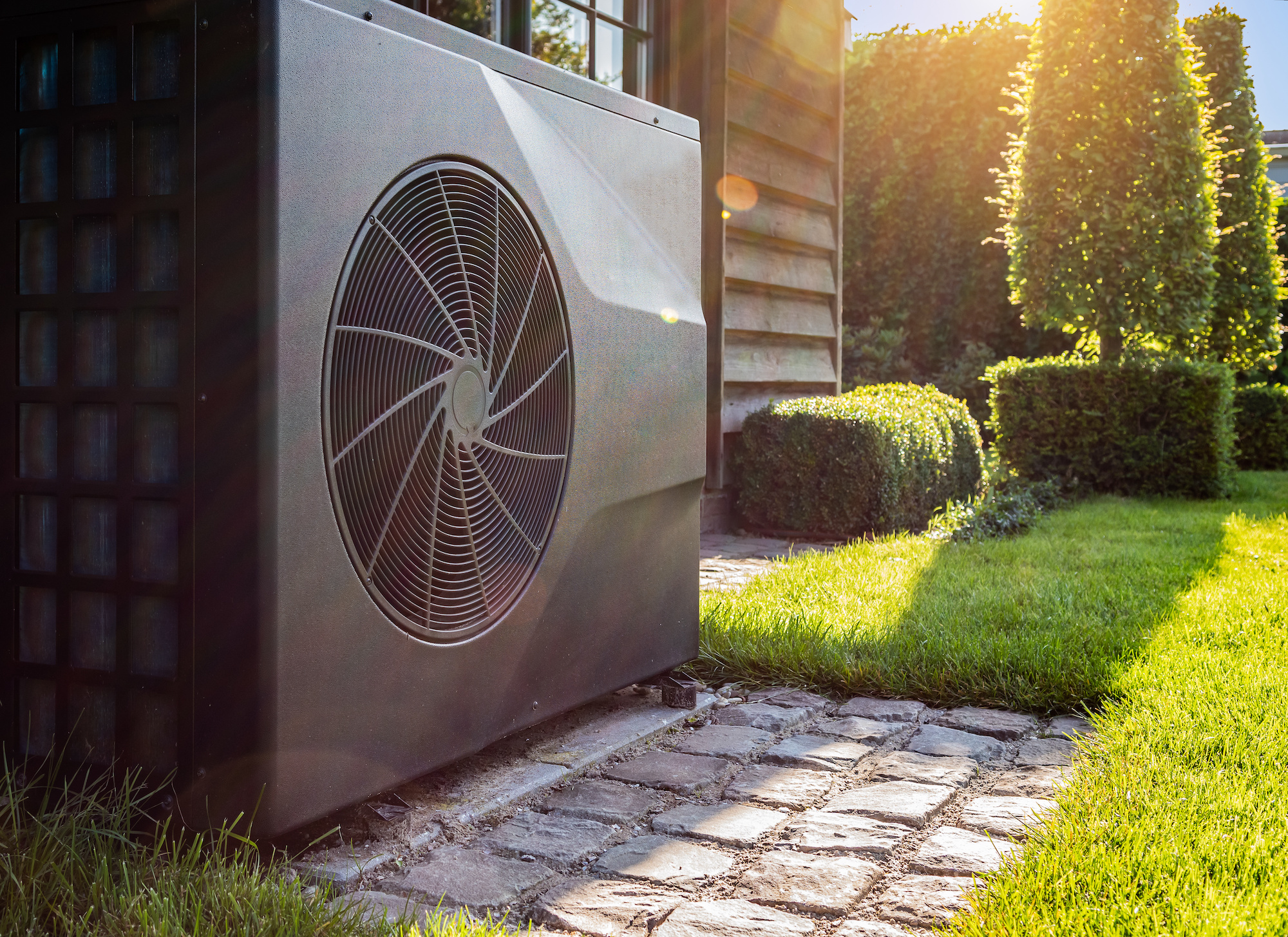
What is a heat pump pool heater?
Heat pumps use electricity to move heat from the outside air to pool water.
They don’t generate heat directly, like an electric heater.
While conventional electric heaters need 1kW of electricity to produce 1kW of heat energy, a heat pump is so efficient that for every 1kW of power consumed it can generate 5kW of heat energy.
Sounds confusing?
Read on for a simple explanation of how heat pump pool heaters work.
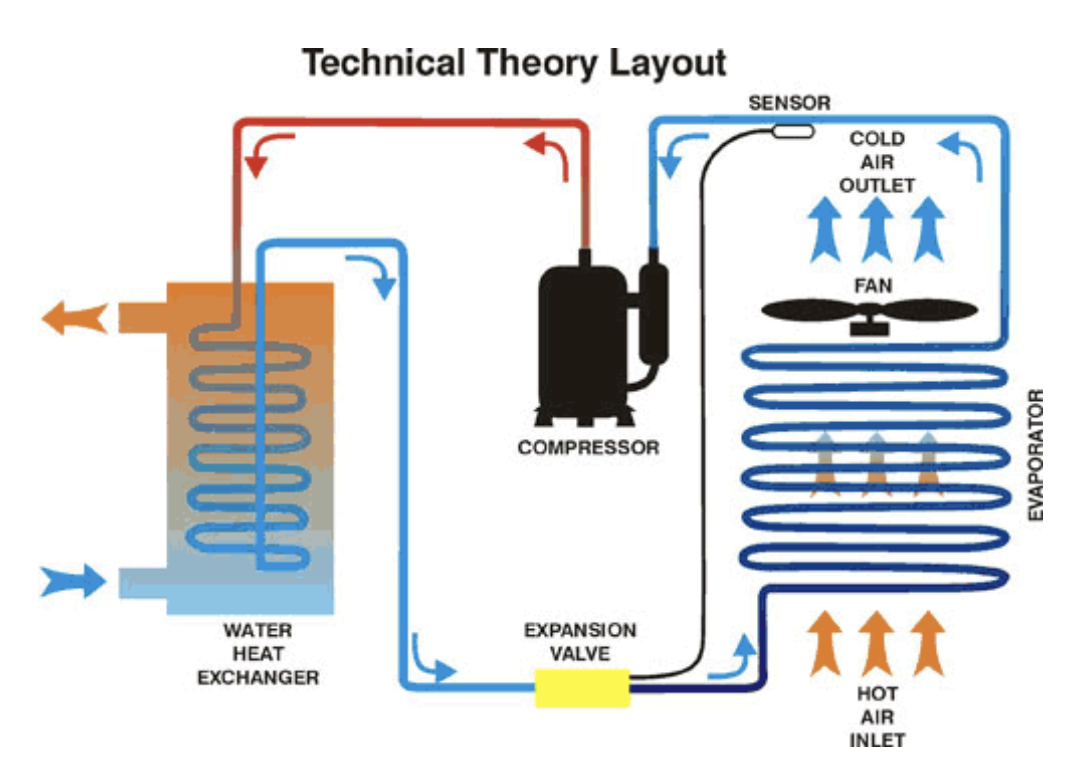
How does a heat pump work?
Heat pump pool heaters rely on the second law of thermodynamics: heat moves from hotter objects to colder objects.
No idea what thermodynamics are?
Think of an ice cube.
If you put an ice cube on your table it will start to melt.
This is because heat flows from the surrounding air (hotter object) to the ice cube (colder object).
What’s that got to do with a heat pump?
A heat pump uses a fan to blow outside air over a coil of tubes containing a very cold liquid refrigerant – so cold that it can absorb heat from the air even on a winter’s day.
Heat from the outside air moves into the cold refrigerant.
But instead of the refrigerant melting away into water like our ice cube, the refrigerant actually turns directly into a gas.
This gas is moved along a system of tubes until it passes through a compressor where it is compressed.
Because gases heat up when compressed the refrigerant comes out of the compressor very hot.
This heat is then transferred to your pool water in a water heat exchanger.
Electricity is needed to power the compressor and the fan – but the heat itself comes from the outside air.
How much does it cost to heat my pool with a heat pump pool heater?
Conventional electric pool heaters need 1kW of electricity to produce 1kW of heating power.
Heat pump pool heaters use around 1kW of electricity to produce 5kW of heating power.
This makes it at least 80% cheaper to run a heat pump.
So how much would it cost to heat your swimming pool in Spain using a heat pump pool heater?
The answer depends on many factors.
As a rough guide we’ve estimated how much it would cost to heat three different sized swimming pools from 16°C up to 26°C – and then keep it warm for a whole month.
The estimation assumes the air temperature will remain between 12°C to 15°C for the whole month, which is roughly the temperature range for March in Alicante in Spain.
For the three swimming pools we’ve estimated the monthly costs for three different kinds of pool heating:
- Conventional electric heater
- Heat pump
- Heat pump + PV solar panels
free download
Want to See the Estimated Monthly Cost to Heat a Swimming Pool to 26°C in Spain in March?
We’ve prepared a .pdf comparing estimated monthly electricity costs to heat a swimming pool using 3 different methods – including our recommended method of using solar panels with a heat pump.
Click below and enter your email address to get the download.
What other costs besides the pool heater should I be aware of?
One of the greatest costs facing swimming pool owners in Spain is the pool pump.
Ideally, you run your pool pump all day for maximum filtration and for crystal-clear water.
But running your pump 24-7 could add an extra €280 to your monthly bill at the current cost of energy in Spain.
That’s why most homeowners run their pool pumps for 4-6 hours a day and automate the pump to run during the early morning or late afternoon when the cost of energy is at its cheapest.
Still, this can lead to an extra €30-90 onto your monthly bill and you may need to overcompensate for reduced filtration by adding extra chemicals to keep the water clear.
Is there a cheaper way to run your pool pump?
There is.
It’s called a variable speed pool pump.
This device lets you set the speed of your pump so you have it running at higher speeds during certain times of the day and lower speeds at others.
A variable speed pool pump gives you constant filtration for the same or less cost than running a conventional pool pump for 4-6 hours a day.
For the most cost-effective solar pool heating solution in Spain, you need to combine this kind of efficient pool pump with a pool heater for maximum comfort and savings.
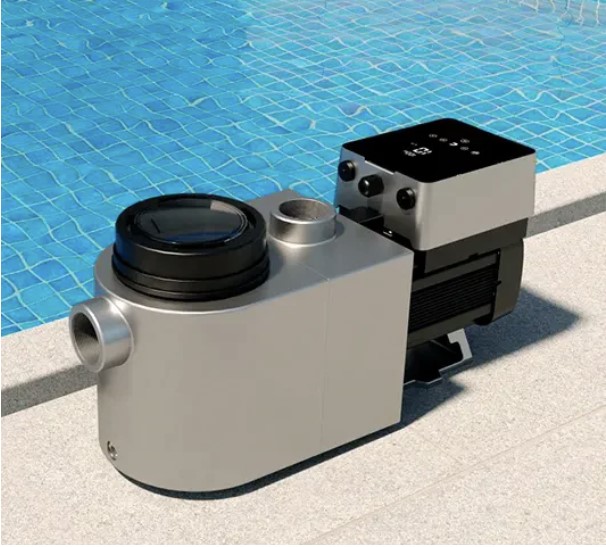
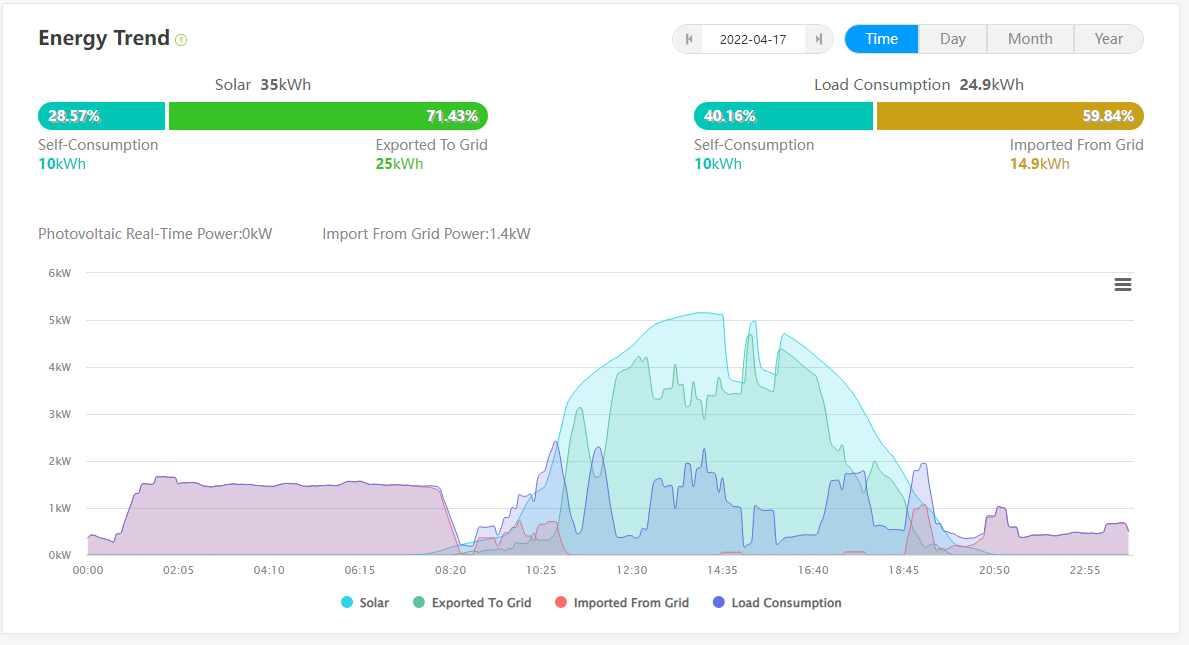
You’re looking at a single day’s electricity consumption for a solar power user in Alicante north, in Spain. The purple line shows the pool pump kicking into action between 1am to 8am. We switched this client over to a variable speed pool pump, helping them to save over €50 a month on electricity bills with PV solar panels (and no solar battery).
What’s the most cost-effective way to heat my swimming pool in Spain?
The most cost-effective solution MiSolar has found for solar pool heating in Spain is this:
Install PV solar panels.
A solar panel installation allows you to use both a heat pump pool heater and a variable speed pool pump for much less monthly cost.
Why is that?
Because you can shift peak operating hours of your pool heater and the variable speed pool pump to during the day when the sun’s out.
So long as you have enough PV solar panels installed, you can 100% use your own electricity to keep your pool warm and crystal clear during the day.
Even in winter.
Of course, you may have a cloudy day or you might need to ramp up your pool heater’s operations during very cold weather.
If you want solar pool heating and still have bills as close to €0 each month as possible, you will need to have a solar battery with sufficient power output and storage to 100% power your pool heating and filtration.
But since this increases the upfront installation cost we often recommend installing PV solar panels and a variable speed pool pump without a solar battery.
You will have bills to pay to heat your pool in winter.
But you’ll be looking at a cost of €50-150 per month in winter instead of €500-1,500 you would be paying to heat and filter your pool water with a conventional electric heater.
How do I know what pool heater and how many PV solar panels I need to heat my swimming pool in Spain?
Heat pump pool heaters come with a range of power outputs from 1kW all the way to 30kW and beyond.
The right one for you depends on three main factors:
- The size, depth and volume of your swimming pool
- The climate, shading and sun your swimming pool gets
- The seasons you wish to use your swimming pool in
You will need a specialist’s opinion and most likely a site visit in order to determine the right pool heater and PV solar panel installation for you.
free download
Want to See the Estimated Monthly Cost to Heat a Swimming Pool to 26°C in Spain in March?
We’ve prepared a pdf comparing estimated monthly electricity costs to heat a swimming pool using 3 different methods.
The 3 methods are:
- Conventional electric heater
- Heat pump
- Heat pump + PV solar panels
As you will see…the difference can be a monthly cost reduction of over €1,000!


Hi, all the guys that came to install my solar and heat pump were excellent, nothing was too much trouble, I would recommend all of them. Thanks again Bill